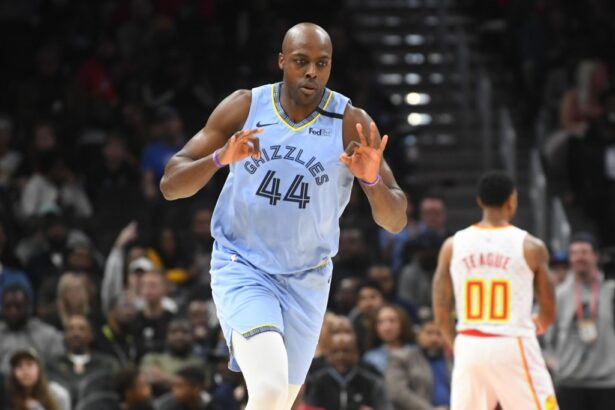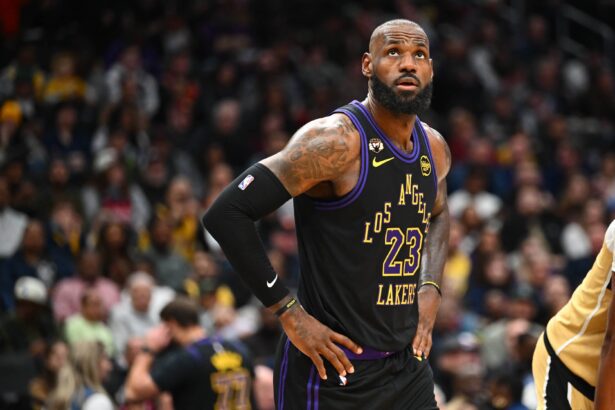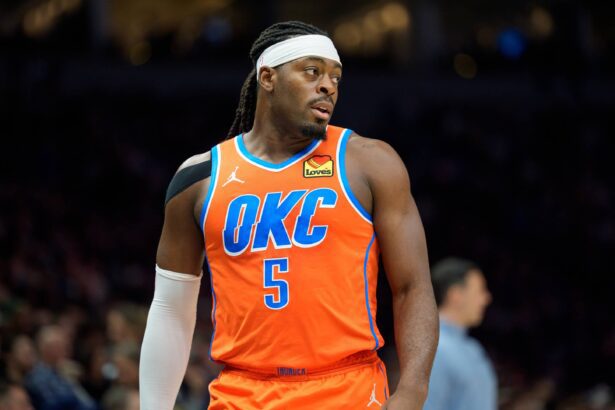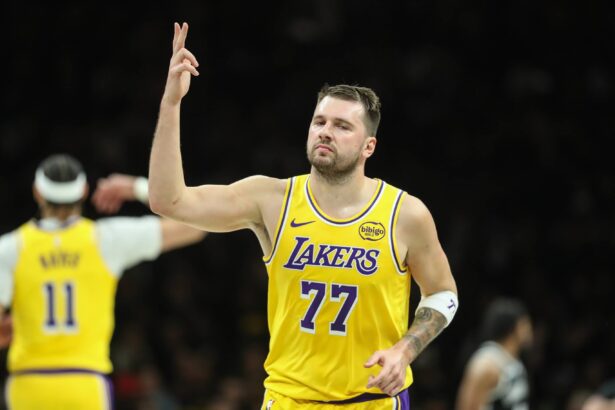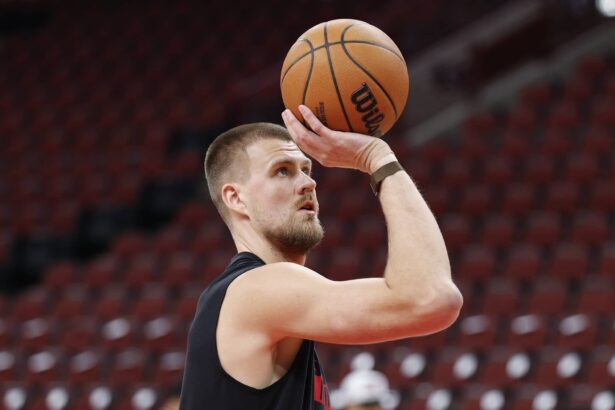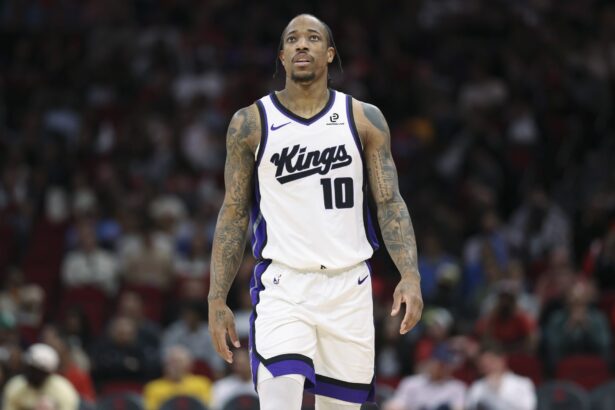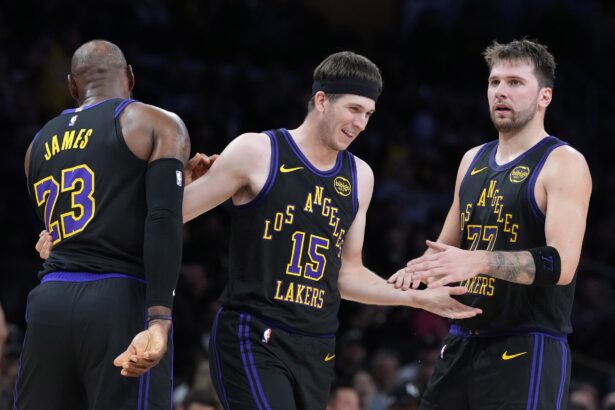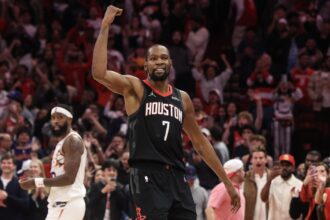The job is done and the Boston Celtics are NBA champions for a record 18th title in history. By defeating the Dallas Mavericks in five games, the Celtics specifically Joe Mazzula, have etched their name into NBA history. Mazzulla has done a tremendous job in coaching the talented Boston Celtics since taking over in 2023, leading them to an Eastern Conference Finals last year and winning the championship in the following season. This recent achievement means the 35-year-old is the youngest coach to ever win an NBA championship. In the storied history of the Celtics, where does Mazzulla rank among the greatest coaches in Celtics history? Let’s find out.
1. Red Auerbach
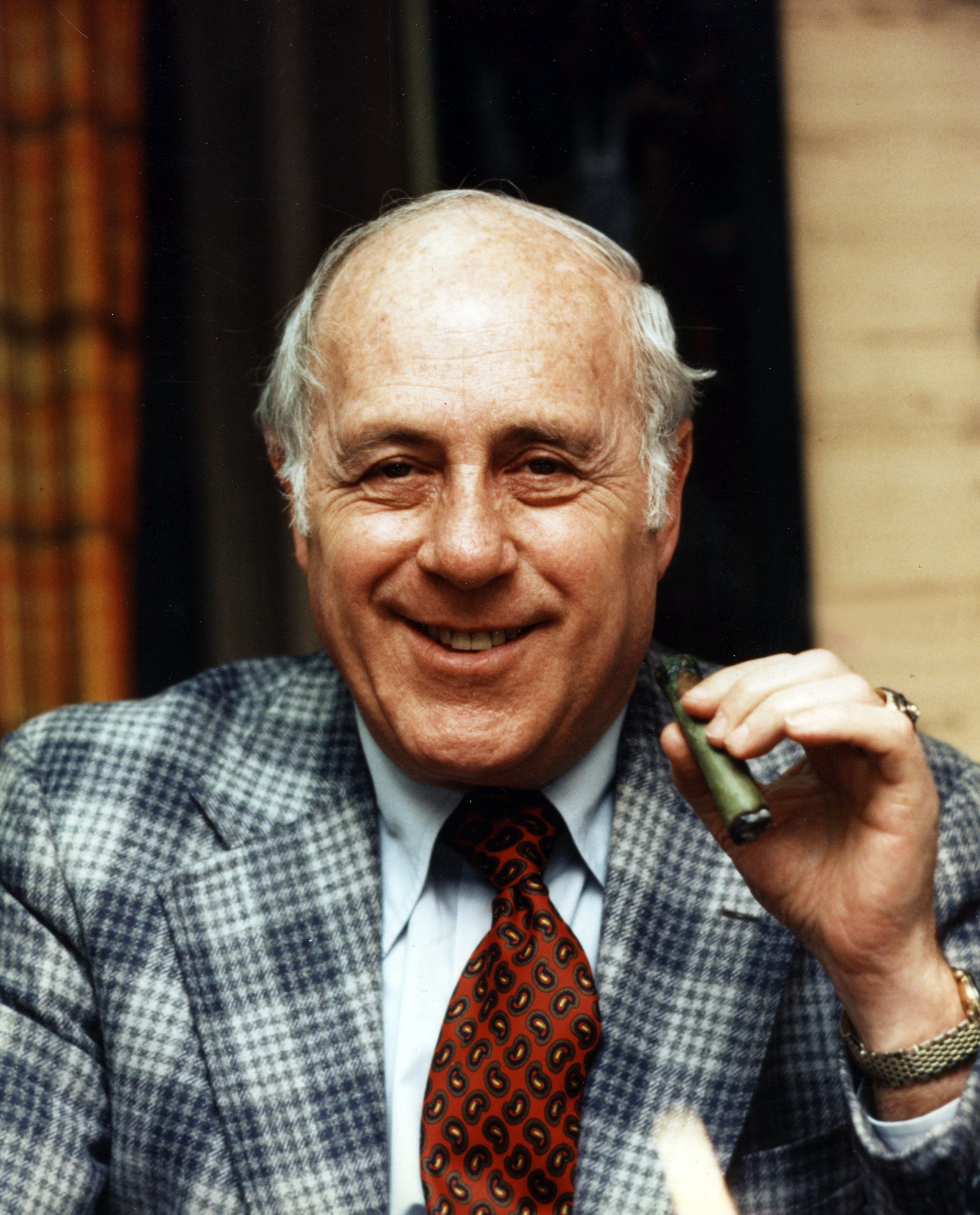
Regular Season Record: 795-397 (66.7%)
Playoff Record: 90-58 (60.8%)
Accomplishments: 9 NBA Championships, 11 NBA Finals appearances, 1964–65 Coach of the Year
Red Auerbach is the cornerstone of Boston Celtics history, widely regarded as one of the greatest coaches in NBA history. His revolutionary approach to team building and game strategy laid the foundation for the Celtics dynasty in the 1950s and 1960s. Auerbach’s coaching style emphasized a fast-paced, aggressive offense coupled with a tenacious defense, perfectly aligning with the talents of players like Bill Russell, Bob Cousy, and John Havlicek. His skill to maximize his players’ strengths and his innovative use of the fast-break offense set him apart from his contemporaries.
Beyond his tactical acumen, Auerbach’s leadership and motivational skills were unparalleled. He fostered a culture of winning and unity, creating an environment where players thrived and team chemistry flourished. His nine championships as a coach, and his subsequent success as a general manager, cemented his legacy as the architect of one of the most dominant eras in sports history.
2. K.C. Jones
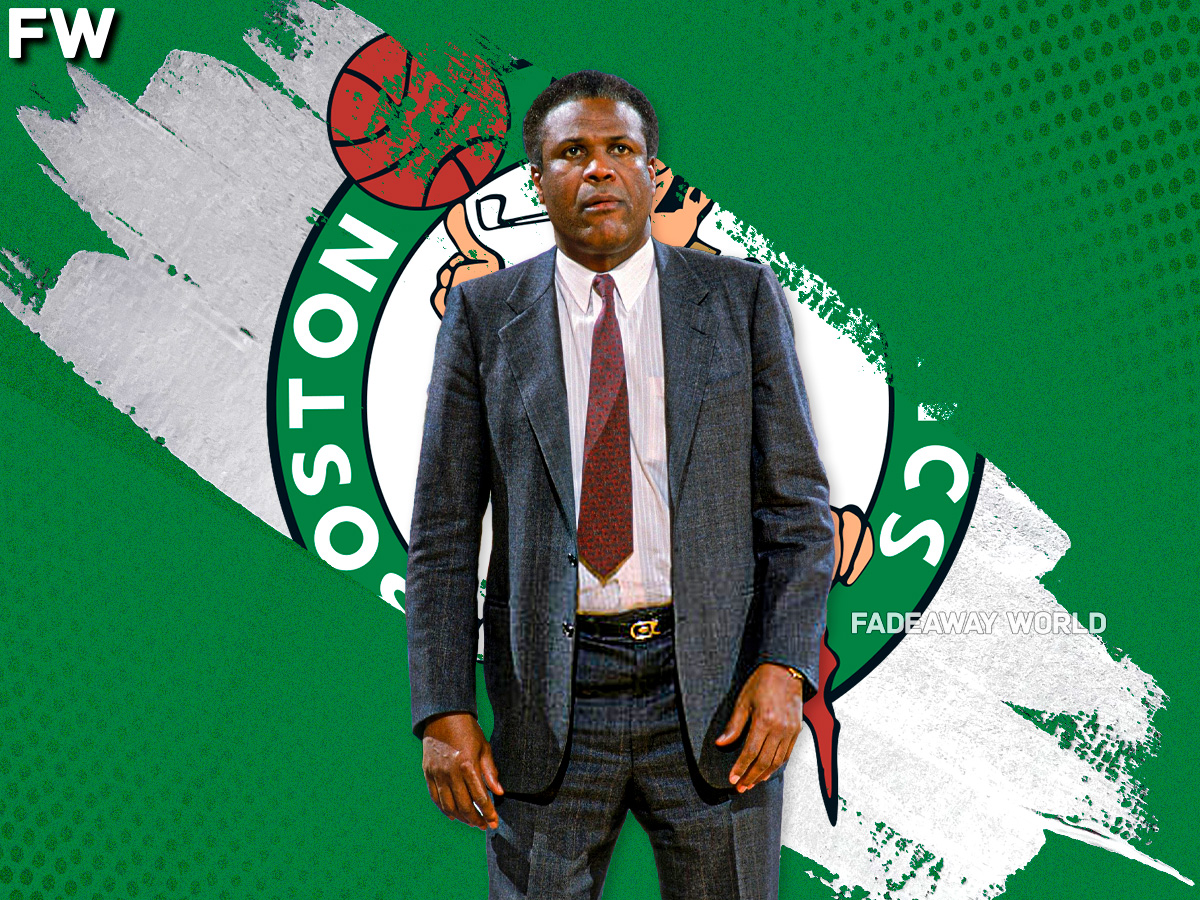
Regular Season Record: 308-102 (75.1%)
Playoff Record: 65-37 (63.7%)
Accomplishments: 2 NBA Championships, 4 NBA Finals appearances
K.C. Jones was the steady hand guiding the Celtics during the mid-1980s, a period marked by intense competition and fierce rivalries. Under his leadership, the Celtics won two NBA Championships in 1984 and 1986, driven by the legendary frontcourt trio of Larry Bird, Kevin McHale, and Robert Parish. Jones’ coaching style was characterized by a calm, understated demeanor that allowed his players to flourish. He trusted his veterans and empowered them to take ownership on the court, which was crucial for managing the egos and talents of a star-studded roster.
Jones’ ability to adapt and adjust during critical moments of the game was a hallmark of his coaching career. His emphasis on strong defense and team-oriented play mirrored the values instilled by his mentor, Red Auerbach. K.C. Jones’ tenure with the Celtics was defined by success and stability, as he guided the team to four NBA Finals appearances in five years.
3. Tom Heinsohn
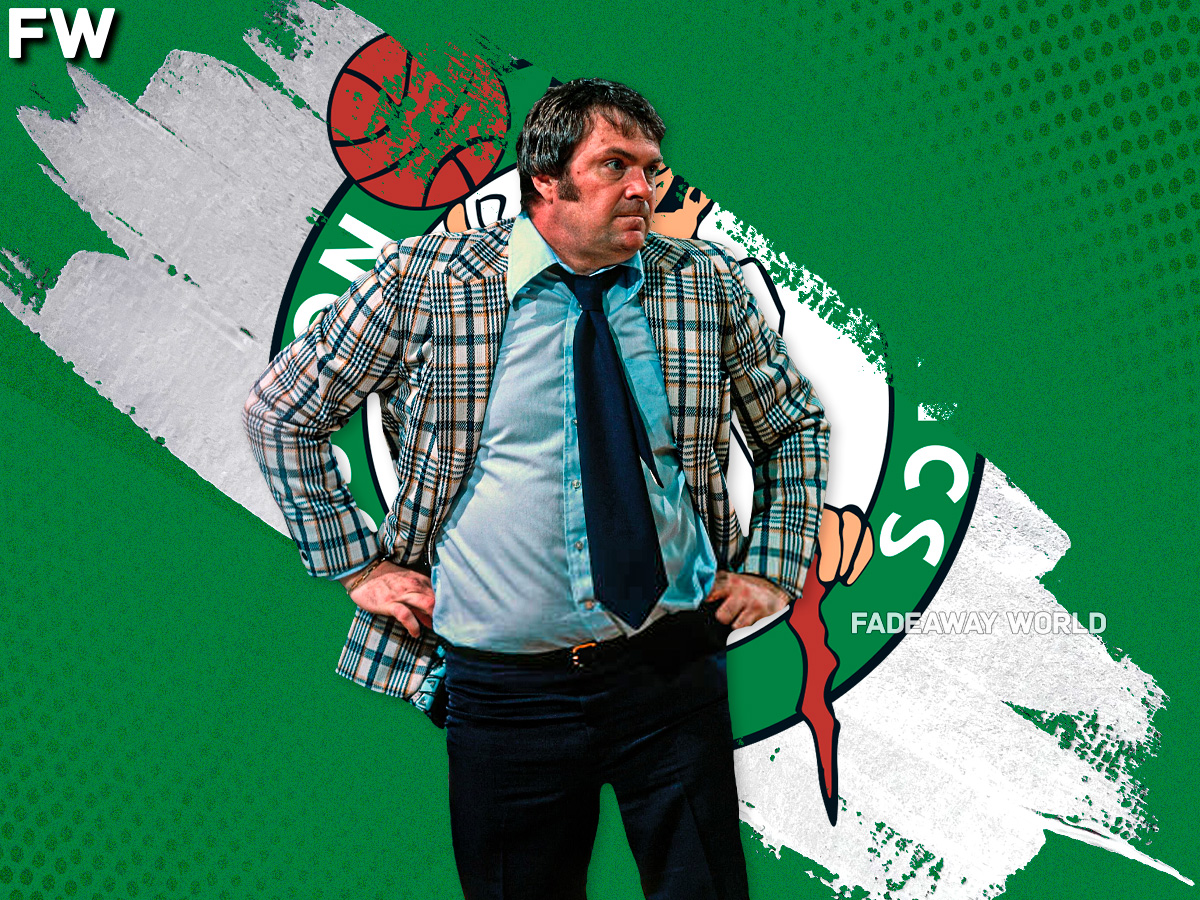
Regular Season Record: 427-263 (61.9%)
Playoff Record: 47-33 (58.8%)
Accomplishments: 2 NBA Championships, 2 NBA Finals appearances, 1972–73 Coach of the Year
Tom Heinsohn, a Celtics legend both on the court and on the sidelines, brought a unique blend of intensity and passion to his coaching career. After a stellar playing career with the Celtics, Heinsohn transitioned seamlessly into coaching, leading the team to two NBA Championships in 1974 and 1976. His coaching style was characterized by an up-tempo offense and an aggressive defensive approach, leveraging the skills of stars like Dave Cowens, John Havlicek, and Jo Jo White.
Heinsohn’s fiery personality and deep understanding of the game resonated with his players, creating a strong bond and a winning mentality. His skill to motivate and inspire his team was instrumental in their success during the 1970s. Heinsohn’s legacy extends beyond his coaching achievements, as he remained a beloved figure in the Celtics organization for decades, serving as a broadcaster and ambassador for the team.
4. Bill Russell

Regular Season Record: 162-83 (66.1%)
Playoff Record: 28-18 (60.9%)
Accomplishments: 2 NBA Championships, 2 NBA Finals appearances
Bill Russell’s transition from player to coach was seamless and historic, as he led the Celtics to two NBA Championships in 1968 and 1969. As a player-coach, Russell’s leadership on and off the court was instrumental in maintaining the Celtics’ dominance during the late 1960s. His understanding of the game, particularly on the defensive end, allowed him to make strategic decisions that kept the team at the top of the league.
His playing career heavily influenced Russell’s coaching style, emphasizing defense, teamwork, and mental toughness. His ability to inspire his teammates, combined with his deep knowledge of the game, made him an effective coach despite the unique challenges of being a player-coach. Russell’s legacy as one of the greatest players and coaches in NBA history is cemented by his success and the respect he commanded from his peers and players.
5. Doc Rivers
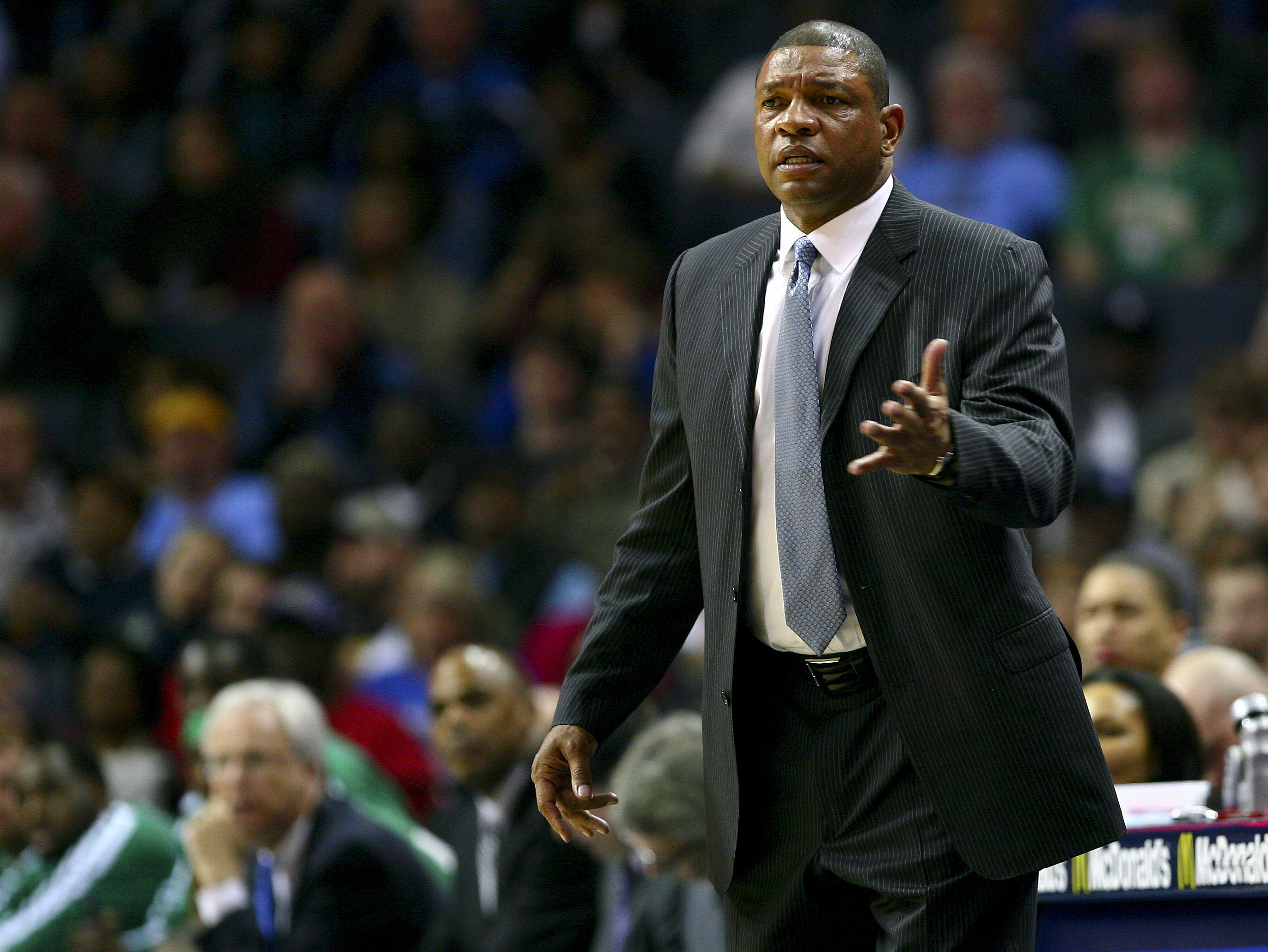
Regular Season Record: 416-305 (57.7%)
Playoff Record: 59-47 (55.7%)
Accomplishments: 1 NBA Championship, 2 NBA Finals appearances
Doc Rivers brought the Celtics back to championship glory in 2008, ending a 22-year title drought and solidifying his place among the franchise’s greatest coaches. Rivers’ tenure with the Celtics was marked by his exceptional understanding to manage egos and build team chemistry, particularly with the “Big Three” of Paul Pierce, Kevin Garnett, and Ray Allen. His defensive philosophy, anchored by assistant coach Tom Thibodeau’s schemes, made the Celtics one of the toughest teams to score against during his era.
Rivers’ leadership and tactical prowess were on full display during the 2008 championship run, where he made crucial in-game adjustments and maintained team focus under pressure proved invaluable. The Celtics’ success under Rivers extended beyond their championship year, with multiple deep playoff runs and another NBA Finals appearance in 2010.
6. Joe Mazzulla

Regular Season Record: 121-43 (73.8%)
Playoff Record: 26-12 (68.4%)
Accomplishments: 1 NBA Championship, 1 NBA Finals appearance
Joe Mazzulla has shown promise as the head coach of the Celtics in his first two seasons and is solidified in history. Under his leadership, the team has maintained a strong regular-season performance and has made significant playoff runs including making the Eastern Conference Finals in 2023 and winning the title in 2024.
His ability to adapt and make strategic adjustments in high-pressure situations has been evident in the playoffs and his improvement as a coach has been there to see. Winning the NBA championship as the youngest coach of all time places him among the greatest Celtics coaches ever and he might just be getting started.
7. Bill Fitch
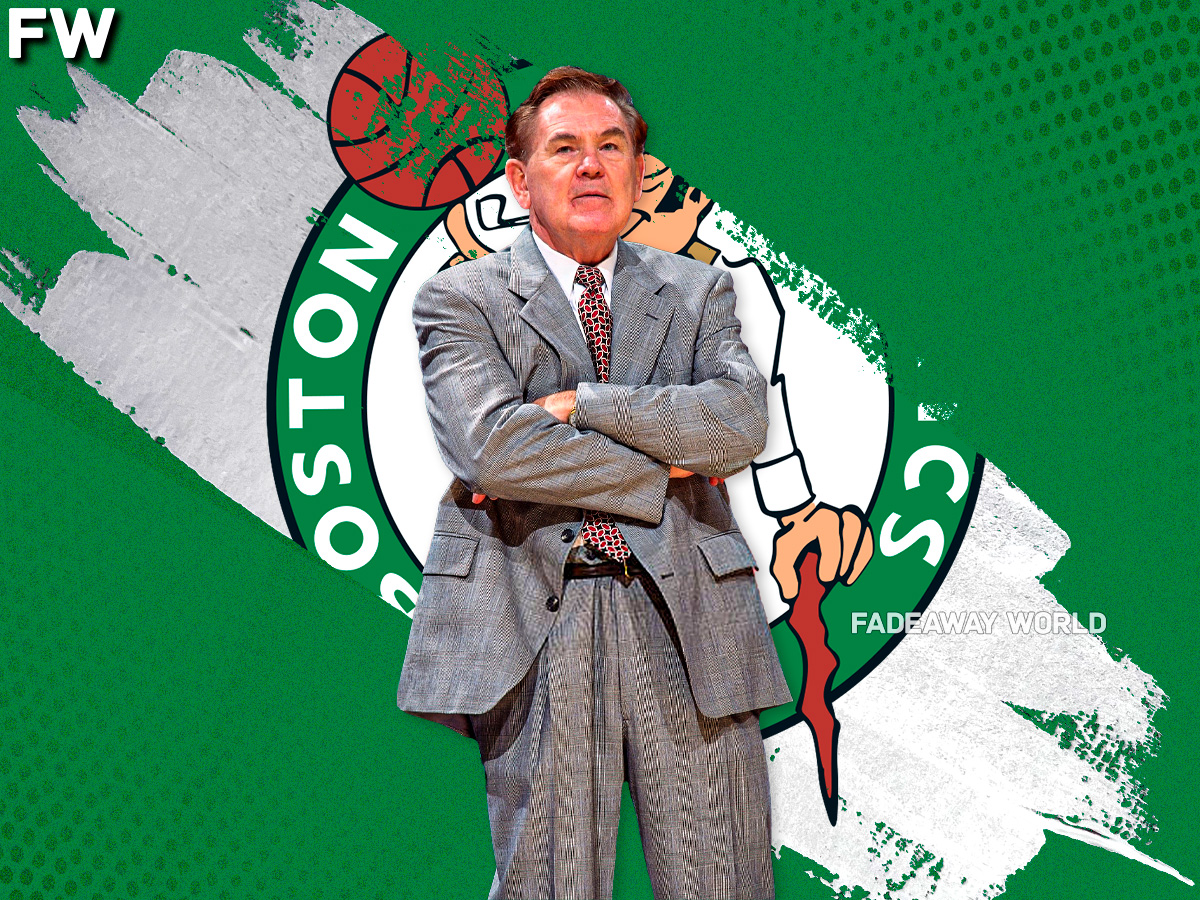
Regular Season Record: 242-86 (73.8%)
Playoff Record: 26-19 (57.8%)
Accomplishments: 1 NBA Championship, 1 NBA Finals appearance, 1979–80 Coach of the Year
Bill Fitch’s tenure with the Celtics was relatively short but incredibly impactful, highlighted by the 1981 NBA Championship. Fitch inherited a team with a promising young talent in Larry Bird and quickly turned them into champions. His coaching style was disciplined and structured, with a strong emphasis on defense and fundamental play. Fitch’s willingness to develop young players and integrate them into a cohesive unit was instrumental in the Celtics’ success during his time.
Fitch’s rigorous approach and attention to detail helped lay the groundwork for the Celtics’ dominance in the 1980s. He was adept at maximizing his players’ potential and creating a winning culture. The 1981 championship run showcased his understanding to navigate the pressures of the playoffs and make critical adjustments. While his time with the Celtics was brief, Fitch’s contributions were pivotal in establishing a foundation for future success.
8. Ime Udoka
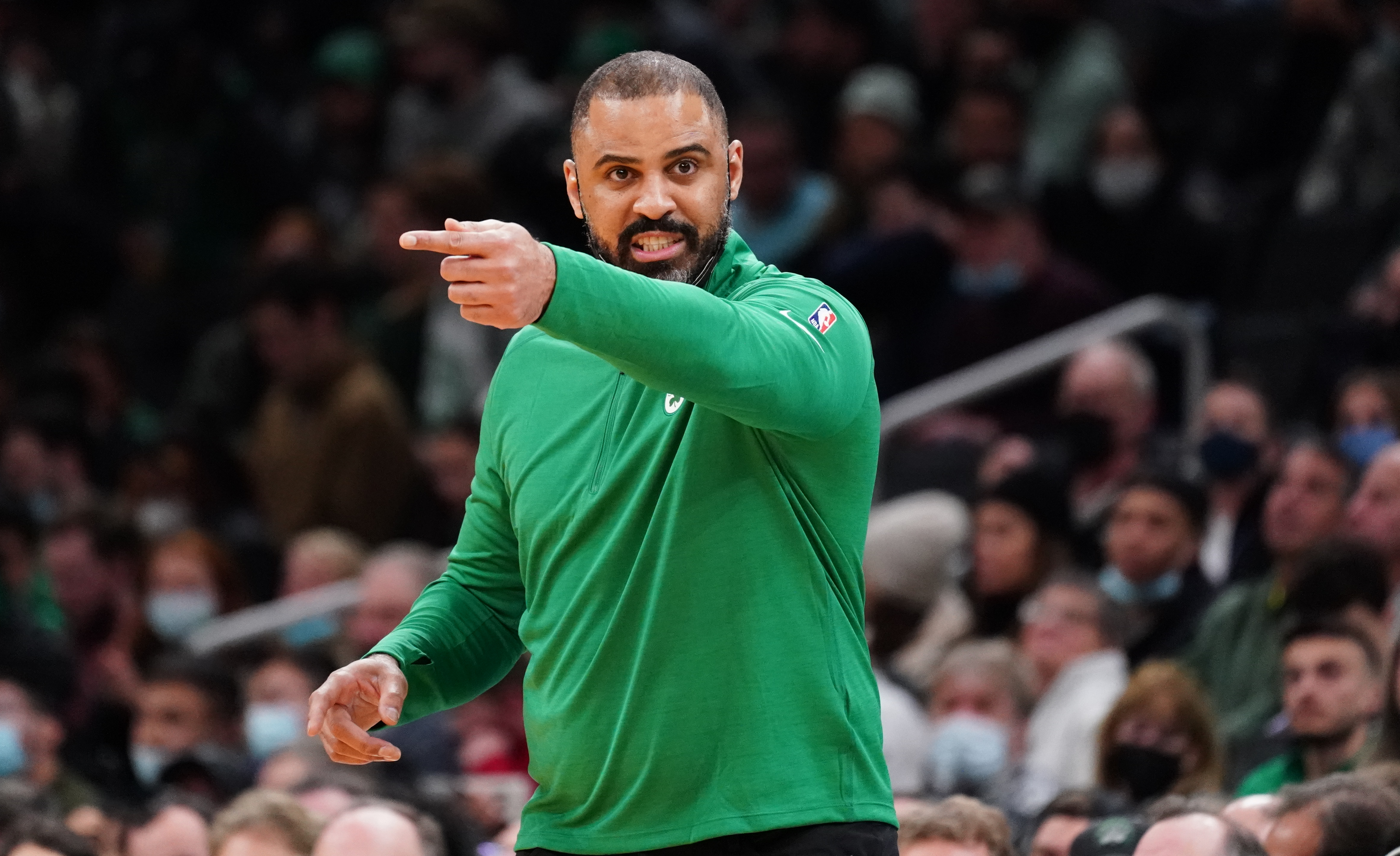
Regular Season Record: 51-31 (62.2%)
Playoff Record: 14-10 (58.3%)
Accomplishments: 1 NBA Finals appearance
Ime Udoka’s brief tenure with the Celtics was marked by a dramatic turnaround and a deep playoff run, culminating in an NBA Finals appearance in his first year as head coach. Udoka’s coaching style emphasized accountability, defense, and ball movement, which resonated well with the team’s young core. His ability to connect with players and instill a winning mentality was evident in the team’s performance.
Udoka’s impact was immediate, as he helped the Celtics navigate a challenging start to the season and finish strong, making a remarkable run to the Finals. His approach to coaching fostered a resilient and disciplined team, capable of executing under pressure. While his time with the Celtics was short due to some off-court issues, Udoka’s influence was significant and set a winning culture.
9. Brad Stevens
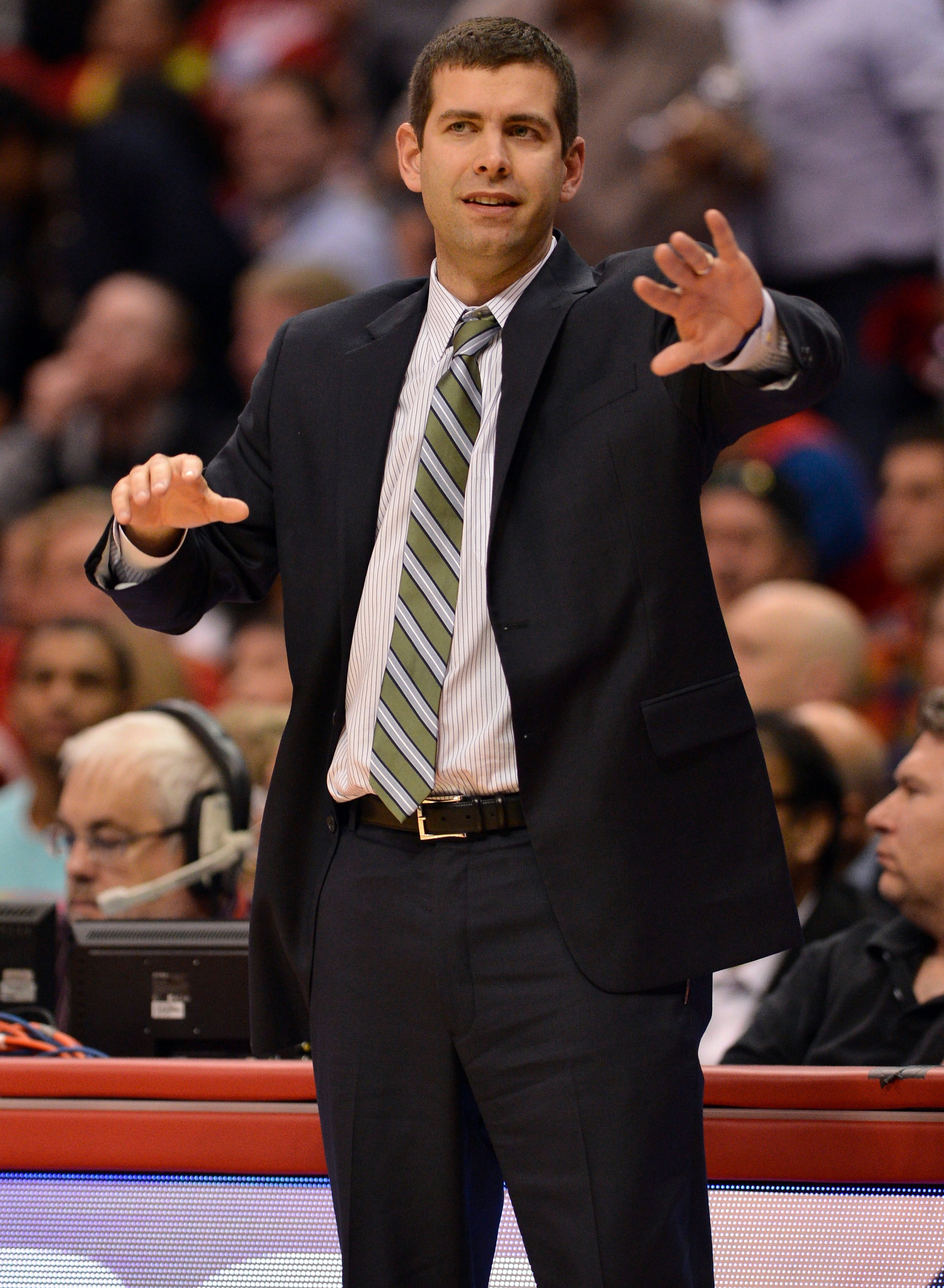
Regular Season Record: 354-282 (55.7%)
Playoff Record: 38-40 (48.7%)
Accomplishments: 3 Eastern Conference Finals appearances
Brad Stevens brought a fresh and analytical approach to the Celtics’ coaching ranks, known for his strategic acumen to maximize his team’s potential. Under his guidance, the Celtics consistently overachieved, often outperforming expectations despite not always having a superstar-laden roster. Stevens’ coaching style was marked by his adaptability, in-game adjustments, and a strong emphasis on player development.
Stevens’ tenure saw the rise of young talents like Jayson Tatum and Jaylen Brown, whom he helped mold into All-Star caliber players. His calm demeanor and meticulous preparation made the Celtics a tough opponent in the playoffs, leading to multiple deep postseason runs. Although he did not secure an NBA Championship, Stevens’ impact on the franchise was profound, and he laid a solid foundation for future success.
10. Chris Ford
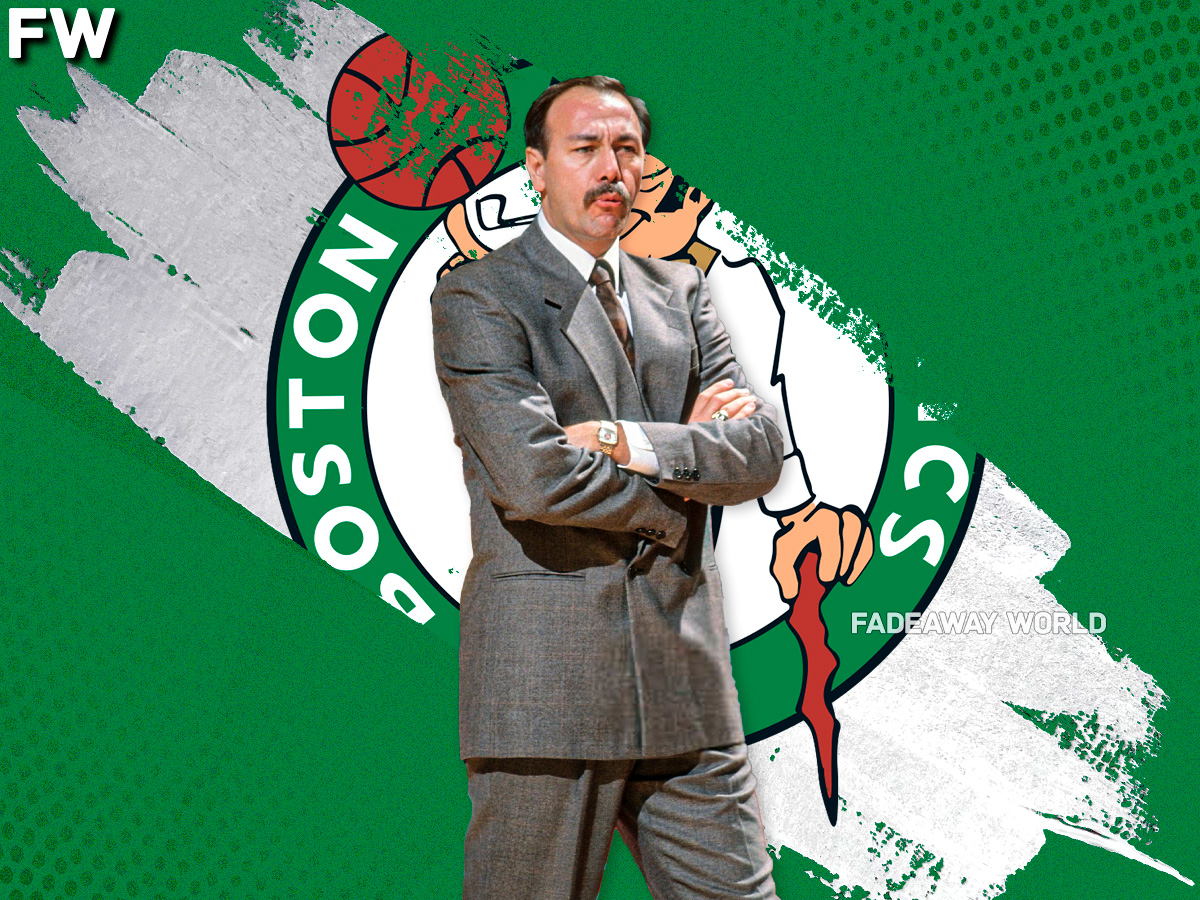
Regular Season Record: 222-188 (54.1%)
Playoff Record: 13-16 (44.8%)
Accomplishments: None
Chris Ford, known for his role as a player in the Celtics’ 1981 championship team, brought his deep understanding of the game to his coaching tenure. Ford’s coaching style emphasized ball movement and a balanced offense, leveraging the talents of players like Reggie Lewis and Dee Brown.
Despite not securing a championship, Ford’s tenure was marked by consistent playoff appearances and the development of key players. His leadership and basketball IQ helped the team navigate a transitional period in the early 1990s. Ford’s contributions as both a player and a coach are remembered fondly by Celtics fans, and his impact on the franchise is appreciated.
11. Jim O’Brien
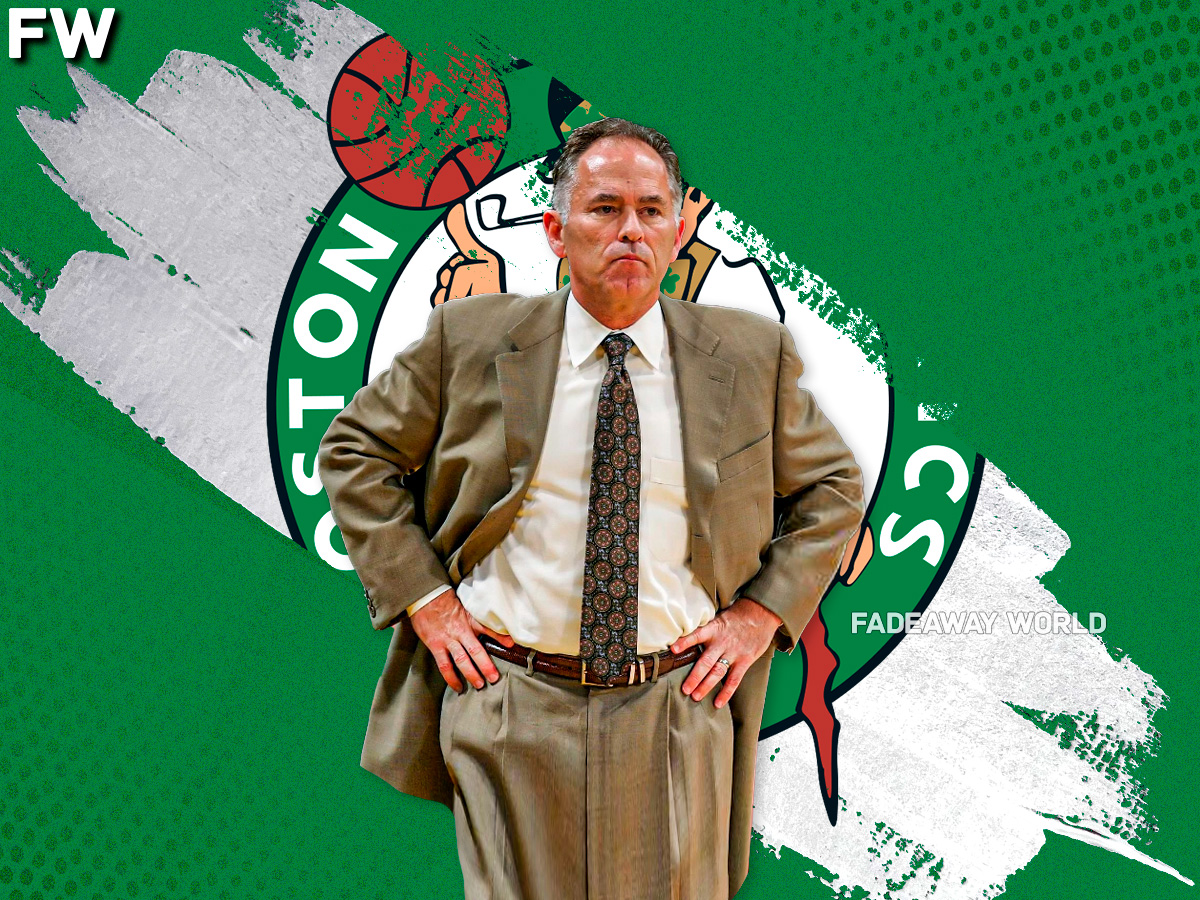
Regular Season Record: 139-119 (53.9%)
Playoff Record: 13-13 (50.0%)
Accomplishments: None
Jim O’Brien’s tenure with the Celtics saw the team navigating a transitional period in the early 2000s. O’Brien’s coaching style was characterized by a focus on defense and a disciplined approach to the game. His ability to maximize the potential of players like Paul Pierce and Antoine Walker helped the team remain competitive during his time.
O’Brien’s leadership was crucial in guiding the Celtics to multiple playoff appearances, including a memorable run to the Eastern Conference Finals in 2002. His emphasis on a strong defensive foundation and his tactical acumen were key factors in the team’s success. While he did not secure a championship, O’Brien’s contributions to the Celtics’ rebuilding process were significant.
12. Jimmy Rodgers
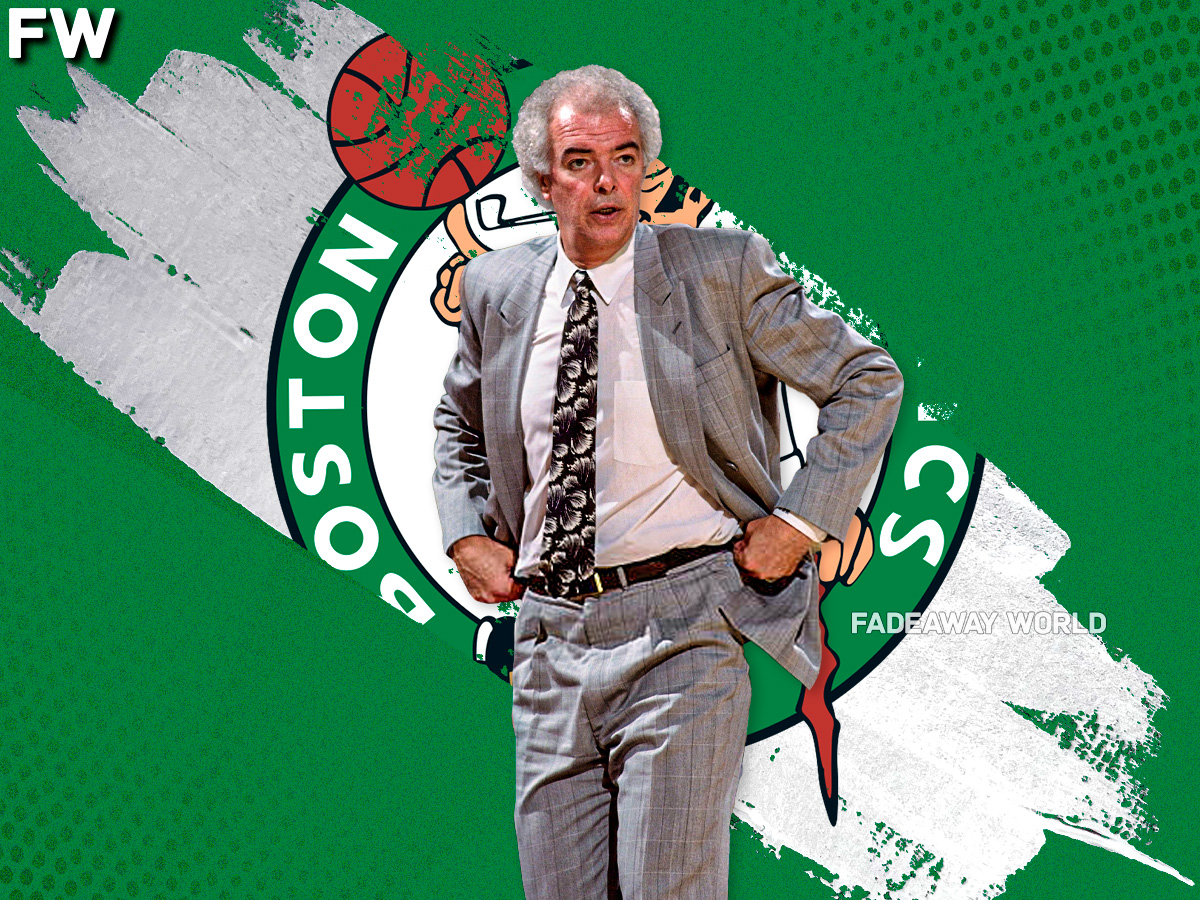
Regular Season Record: 94-70 (57.3%)
Playoff Record: 2-6 (25.0%)
Accomplishments: None
Jimmy Rodgers’ time as the head coach of the Celtics was brief and challenging, marked by a period of transition for the team. Rodgers inherited a roster with aging stars and faced the difficult task of maintaining competitiveness. His coaching style focused on defense and disciplined play, but the team’s struggles with injuries and roster changes made it difficult to achieve sustained success.
Rodgers’ tenure was highlighted by his efforts to integrate younger players and adapt to the evolving dynamics of the team. While he did not achieve significant playoff success, his contributions to the development of the team’s future core were important. Rodgers’ impact on the Celtics, though not marked by championships, was part of the larger narrative of the franchise’s history.
13. Tom Sanders
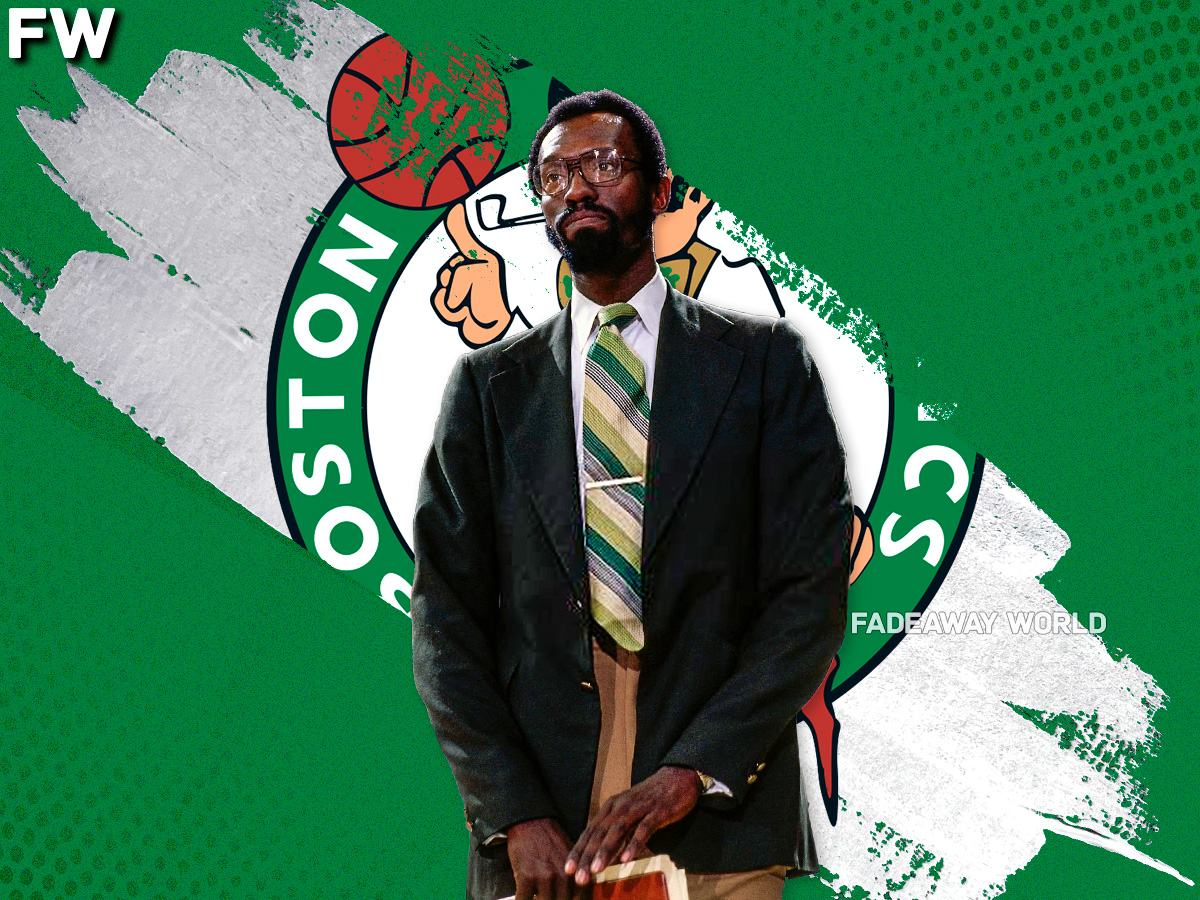
Regular Season Record: 23-39 (37.1%)
Playoff Record: 0-0
Accomplishments: None
Tom Sanders, a Celtics legend from his playing days, took on the coaching role during a difficult period for the team. Sanders’ coaching style was influenced by his experience as a player, emphasizing defense and teamwork. However, his brief tenure was marked by struggles and a lack of stability, making it challenging to achieve significant success.
Despite the difficulties, Sanders’ impact on the team was felt in his efforts to instill a strong work ethic and commitment to the game. His connection to the Celtics’ storied past and his dedication to the franchise were evident in his approach. While his coaching record may not reflect major achievements, Sanders’ contributions to the Celtics’ legacy are respected and remembered.
14. Alvin Julian
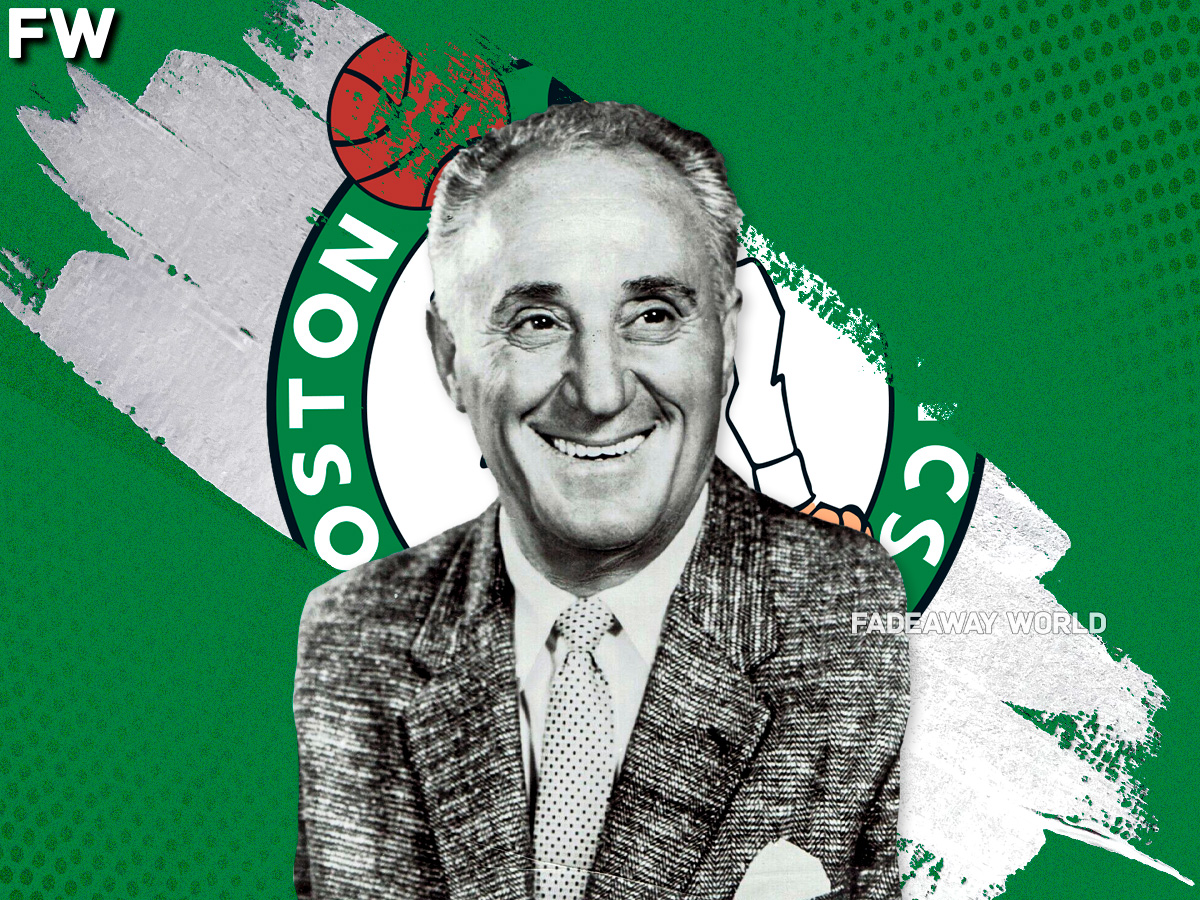
Regular Season Record: 47-81 (36.7%)
Playoff Record: 0-0
Accomplishments: None
Alvin Julian’s tenure as head coach of the Celtics was marked by the team’s early struggles in the league. Julian’s coaching style emphasized fundamentals and building a strong foundation, but the team faced numerous challenges during his time. Despite the lack of significant success, Julian’s efforts were important in laying the groundwork for the franchise’s future.
Julian’s impact on the Celtics is remembered as part of the team’s formative years. His dedication to the game and his commitment to developing the team were evident, even in the face of difficulties. While his record may not reflect major achievements, Julian’s role in the Celtics’ history is appreciated for his contributions to the team’s early development.
15. Rick Pitino
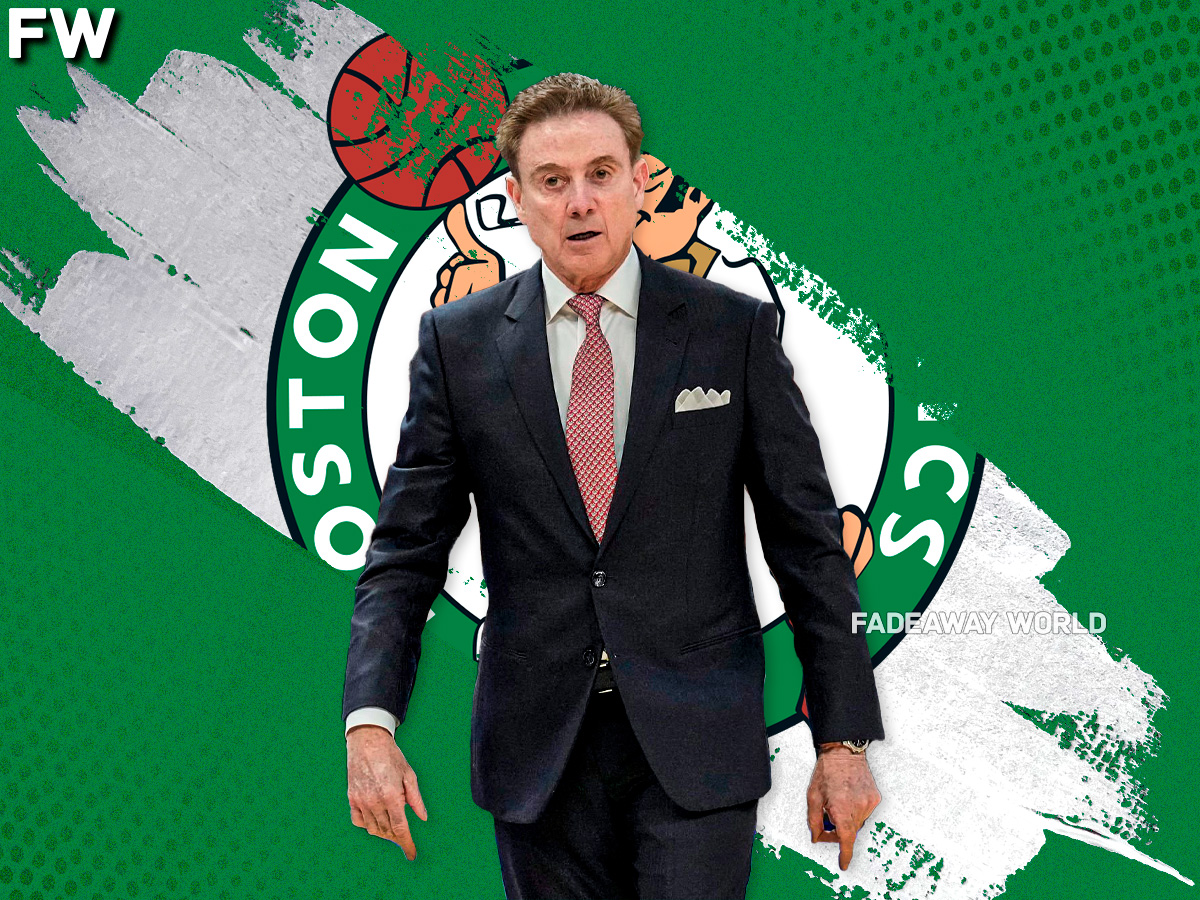
Regular Season Record: 102-146 (41.1%)
Playoff Record: 0-0
Accomplishments: None
Rick Pitino’s tenure with the Celtics is often remembered for its high expectations and subsequent disappointments. Pitino, a highly successful college coach, brought his aggressive, up-tempo style to the NBA, but the transition proved challenging. His coaching style, which emphasized pressure defense and fast-paced offense, struggled to find consistent success at the professional level.
Pitino’s time with the Celtics was marked by frequent roster changes and a lack of steadiness, making it difficult to build a cohesive team. Despite his efforts to turn the franchise around, the results fell short of expectations. Pitino’s tenure serves as a reminder of the challenges faced when transitioning from college coaching to the NBA, and his impact on the Celtics’ history is viewed with mixed emotions.
16. Dave Cowens
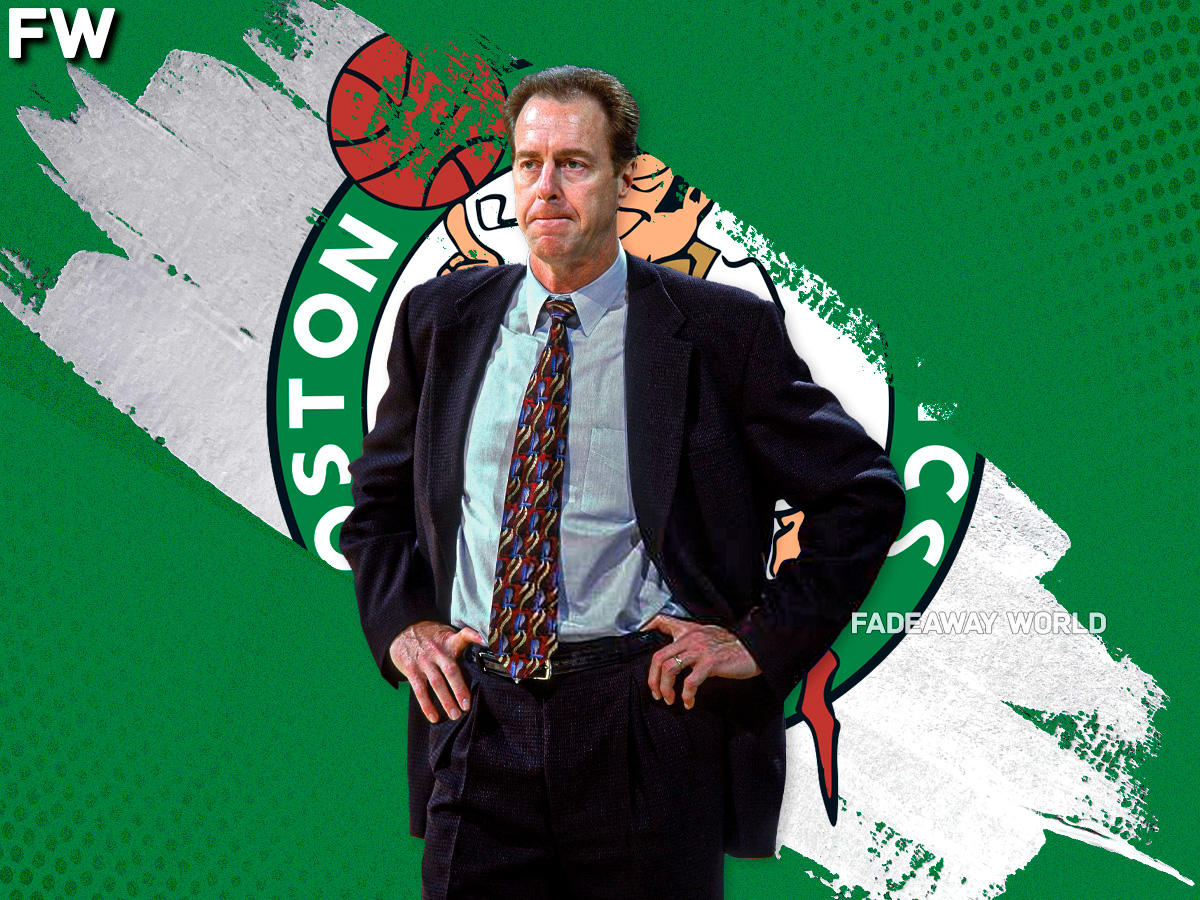
Regular Season Record: 27-41 (39.7%)
Playoff Record: 0-0
Accomplishments: None
Dave Cowens, a Celtics legend as a player, took on the role of player-coach during a challenging period for the team. Cowens’ coaching style was heavily influenced by his playing career, emphasizing toughness, defense, and a blue-collar work ethic. However, the dual role of player-coach proved to be a significant challenge, impacting the team’s overall performance.
Cowens’ brief tenure as coach is remembered for his dedication and commitment to the team, despite the difficulties. His leadership and knowledge of the game were evident, but the complexities of managing both roles were considerable. While his coaching record may not reflect major success, Cowens’ contributions to the Celtics as both a player and a coach are respected and appreciated.
17. John Russell
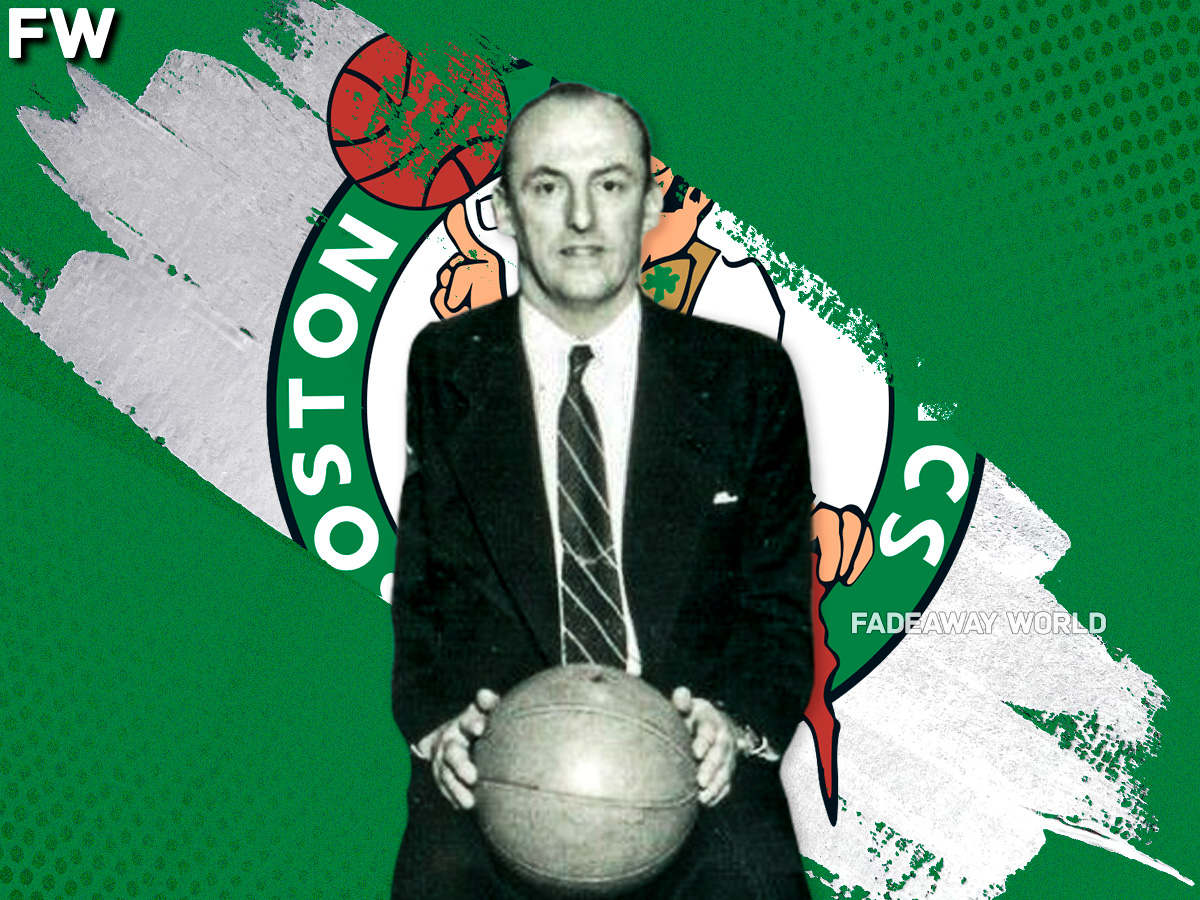
Regular Season Record: 42-66 (38.9%)
Playoff Record: 1-2 (33.3%)
Accomplishments: None
John Russell’s tenure with the Celtics was marked by the team’s struggles to find consistent success. Russell’s coaching style focused on building a solid foundation and developing the team’s young talent. However, the challenges of the era, combined with the team’s transitional phase, made it difficult to achieve significant success.
Despite the difficulties, Russell’s efforts to instill a strong work ethic and commitment to fundamentals were important for the team’s development. His impact on the Celtics is remembered as part of the franchise’s early history, contributing to the foundation that would eventually lead to greater success. Russell’s contributions, though not marked by major achievements, are appreciated as part of the team’s journey.
18. M.L. Carr
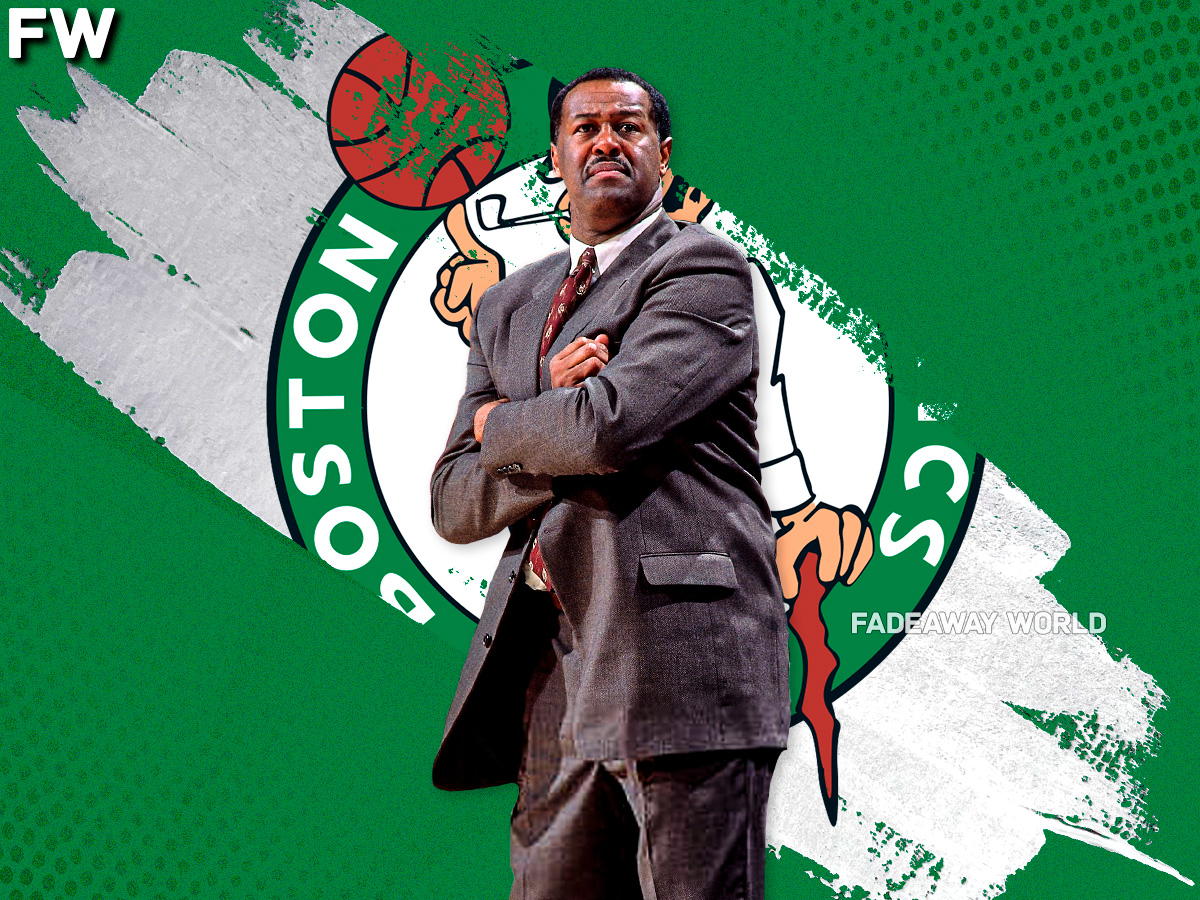
Regular Season Record: 48-116 (29.3%)
Playoff Record: 0-0
Accomplishments: None
M.L. Carr’s tenure as head coach of the Celtics was marked by significant challenges and limited success. Carr, known for his energy and enthusiasm as a player, brought that same passion to his coaching role. However, the team’s struggles with roster stability and performance made it difficult to achieve positive results. His tenure is often remembered for the difficulties the team faced both on and off the court.
Carr’s impact on the Celtics is seen through his dedication and commitment to the franchise, even in the face of adversity. His efforts to rebuild and instill a sense of pride in the team were important, though the results were not as successful as hoped. Carr’s time as head coach is a part of the Celtics’ history that reflects the challenges and complexities of maintaining a competitive team.
19. John Carroll
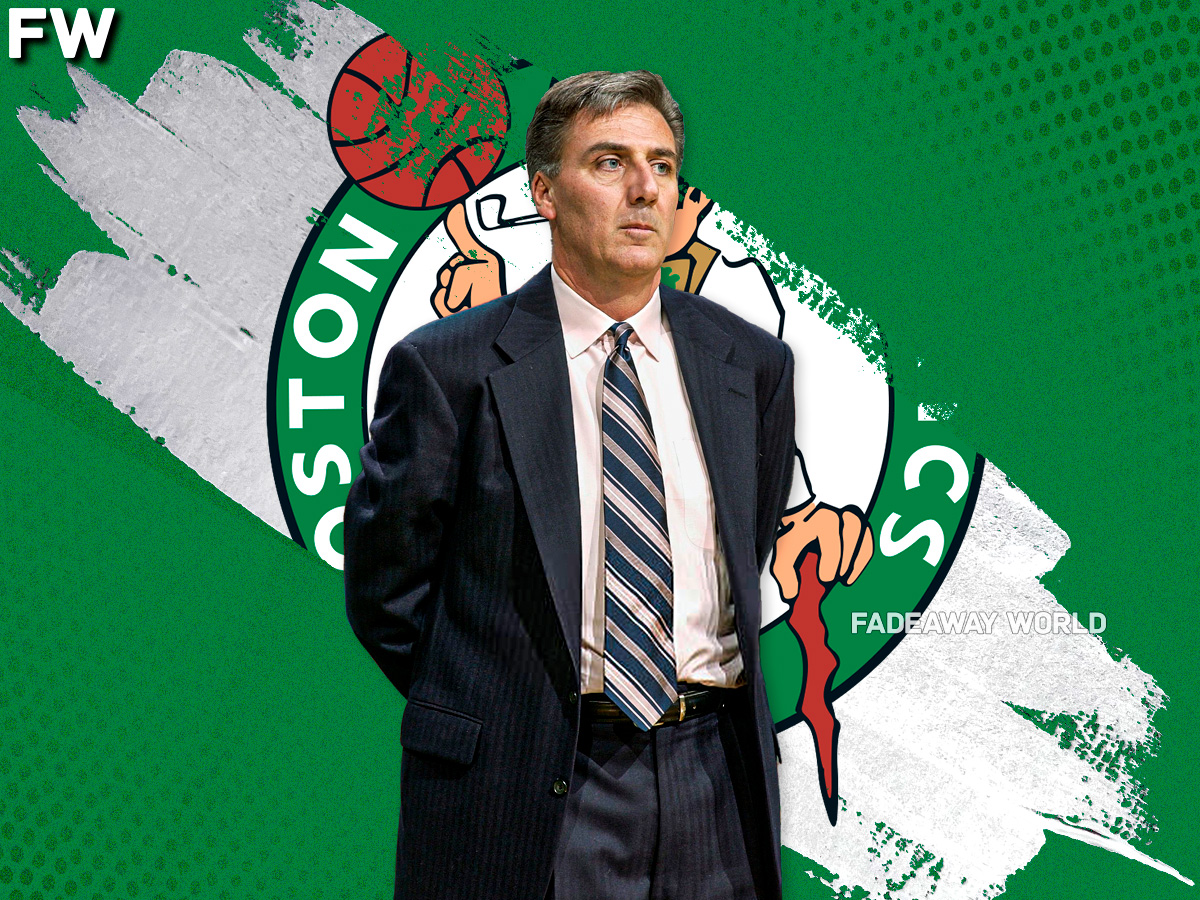
Regular Season Record: 14-22 (38.9%)
Playoff Record: 0-4 (0.0%)
Accomplishments: None
John Carroll’s brief stint as the Celtics’ head coach came during a transitional phase for the team. Carroll, who stepped in as an interim coach, faced the challenge of guiding the team through a difficult period. His coaching style emphasized fundamentals, but the short duration of his tenure limited his ability to make a significant impact.
Carroll’s time with the Celtics is remembered for his efforts to provide leadership and continuity during a tumultuous period. While his record may not reflect major achievements, his contributions to the team during a challenging time are appreciated.
Thank you for being a valued reader of Fadeaway World. If you liked this article, please consider following us on Google News. We appreciate your support






